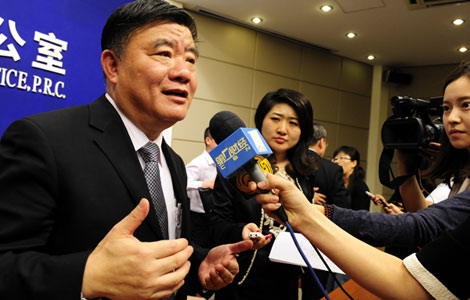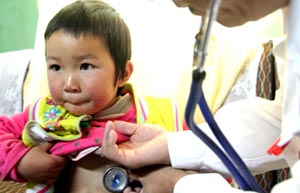Health center a new model for reform
[2012-09-18 07:45]The government-backed Beijing International Medical Center was launched on Monday, which senior health officials said would become a new model of medical reform to encourage social and foreign investments in the country's medical market.
Rural healthcare security
[2012-09-13 07:50]Increasing the number of serious diseases that are covered by medical insurance will lower patients' risk of being ruined by hefty medical bills. This is particularly true for rural residents.
Mobile healthcare promising in China: report
[2012-09-04 16:10]Widespread adoption of mobile technology in healthcare in China is now viewed as inevitable by 80 percent of doctors and healthcare payers.
Healthcare system to get 400b yuan injection
[2012-09-04 08:07]Increase in cases of chronic diseases can mean opportunities for medical firms
Policies encourage development of private hospitals
[2012-08-31 20:14]Private hospitals in Beijing will have more chances to be competitive with public hospitals, authorities said.
China expands healthcare insurance coverage
[2012-08-31 14:23]China on Thursday announced a decision to expand the coverage of the country's healthcare insurance system to include the treatment of critical illnesses.
Better insurance to prevent illness-led poverty
[2012-08-30 20:24]China on Thursday announced a decision to expand the coverage of the country's healthcare insurance system to include the treatment of critical illnesses, aiming to prevent patients from being reduced to poverty by necessary healthcare costs.
Healthcare expenditure booms in China: report
[2012-08-29 16:59]China's is expected to spend $1 trillion on healthcare in 2020, up from $357 last year, according to McKinsey & Company Inc.
Qinghai medical care caters for local demand
[2012-08-15 10:54]Qinghai province will continue to carry out the central government's medical reform policies, while taking more steps to meet local people's specific demands.
China's healthcare: The case for a joint approach
[2012-08-15 08:02]Over the past decade the speed of development in China has placed the country's infrastructure under increased pressure.
Medical firms focus on grassroots market
[2012-07-26 11:00]When showing the device he is selling, Liu Simin usually has to explain that it is not a smartphone but medical equipment.
Foreign investors eye medical services
[2012-07-23 09:15]The opening of the first Taiwan-funded hospital in Shanghai sent a signal about overseas investment in medical institutions on the Chinese mainland.
Li calls for further healthcare reforms
[2012-07-20 13:28]Vice-Premier Li Keqiang urged to push forward with medical reform to insure people with acute diseases and serious chronological diseases.
Free healthcare for China's rural children
[2012-07-19 11:30]A free healthcare program will cover 22,000 children living in one of China's poorest counties with a premium of 200,000 yuan ($31,700).
China targets 90% rural healthcare coverage
[2012-07-12 09:49]Most of the population of China's poverty-stricken areas will be covered by a rural healthcare scheme by 2015, if targets set in a Health Ministry blueprint are met.
Healthcare remedies
[2012-06-20 13:21]That the basic healthcare security net-work now covers all 1.3 billion residents shows what China's healthcare reform has achieved since further reform was initiated three years ago.
Investors eye high-end healthcare
[2012-06-19 09:55]As demand for high-quality healthcare rises in China, venture capital and private equity companies are taking advantage of ample investment opportunities.
Counties to lead public hospital reform
[2012-06-16 14:49]China's county-level hospitals are to lead the country's reform on public healthcare facilities, under a guideline published Friday on the central government's website.
Public hospital reform begins in counties
[2012-06-15 19:45]China's county-level hospitals are to lead the country's reform on public healthcare facilities, under a guideline published Friday on the central government's website.
Cross-Straits hospital opens in August
[2012-05-30 09:15]The first cross-Straits hospital in Beijing will be open in August.




